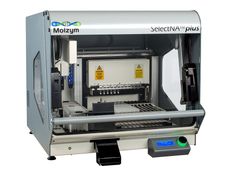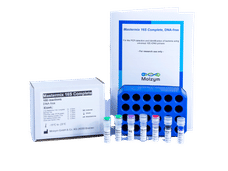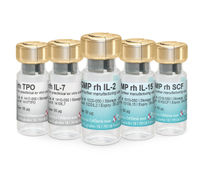New System for Microwave-Assisted Peptide Synthesis
The application of microwave energy has proved to be a major enabling tool for many chemical applications requiring energy input. A new technique for microwave-assisted, solid-phase peptide synthesis has been developed that allows for coupling times as low as two minutes. A single-mode cavity is used to allow for a high microwave power density and a uniform field distribution. A vessel is placed inside of the cavity to allow for filtration of the solution and easy addition of reagents. Also, enhanced cleavage of the final peptide product from the resin takes place in the microwave cavity. The technique uses microwave irradiation and cooling simultaneously to keep the overall bulk temperature of the solution low, while allowing for maximum microwave energy input. This method allows for simple automation that will also be discussed.
Microwave energy allows for higher resin substitution and less excess reagents to be used, increasing scale-up potential when compared to traditional methods. Aggregation is lessened by microwave energy allowing for the possibility of longer peptide sequences. The use of a universal method for microwave-assisted, solid-phase peptide synthesis will be explored. Specific examples of the effects of the microwave energy on coupling times, yields, racemization, sequence length, and scale up will be presented and discussed.
Most read news
Other news from the department research and development
These products might interest you

Micro-Dx™ CE IVD by Molzym
Fully automated from sample to PCR analysis
Rapid identification of bacteria and fungi without time-consuming cultivation

DNA-free Taq Polymerases and Mastermixes by Molzym
DNA-free reagents for unrivalled sensitivity in molecular biology
Purity that makes the difference

DNA/RNA Shield™ SafeCollect Collection Kits by Zymo Research
Sample collection devices for simple & safe at-home testing
Best user experience for secure self-collection

Recombumin® Elite by Sartorius
ICHQ7 cGMP-compliant albumin for biotechnological applications
Increase consistency and safety for gene therapies and vaccines

CellGenix® Growth Factors and Cytokines by Sartorius
Recombinant growth factors without animal products
Optimised cell culture for T cells and MSCs in gene therapy

Greener Alternative Products by Merck
Sustainable laboratory products for environmentally conscious research
Over 2,500 ecological alternatives to reduce your laboratory footprint

Get the life science industry in your inbox
By submitting this form you agree that LUMITOS AG will send you the newsletter(s) selected above by email. Your data will not be passed on to third parties. Your data will be stored and processed in accordance with our data protection regulations. LUMITOS may contact you by email for the purpose of advertising or market and opinion surveys. You can revoke your consent at any time without giving reasons to LUMITOS AG, Ernst-Augustin-Str. 2, 12489 Berlin, Germany or by e-mail at revoke@lumitos.com with effect for the future. In addition, each email contains a link to unsubscribe from the corresponding newsletter.





















































